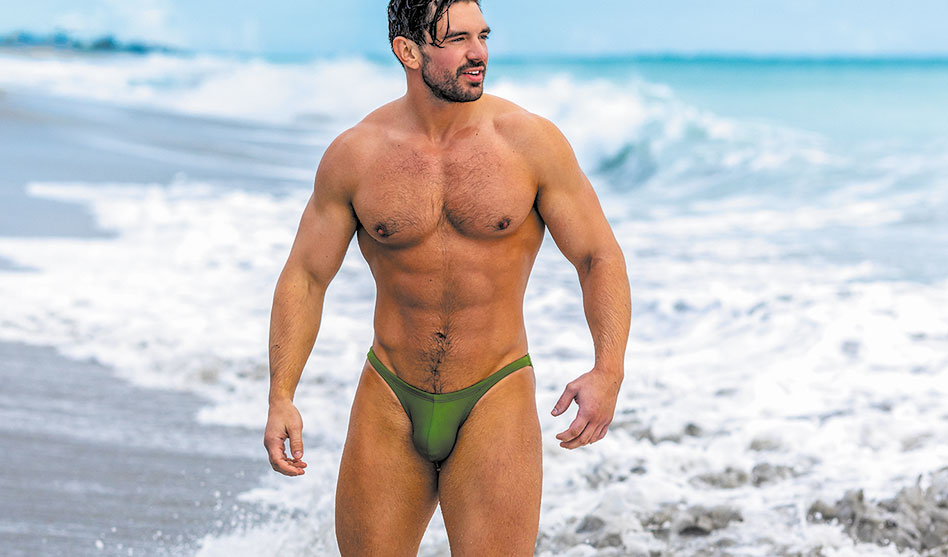An interview with Steve Grand
GREGG SHAPIRO | Contributing Writer
greggshapiro@aol.com
What’s the first thing that comes to mind when you think of gay singer/songwriter-turned-fashion-designer Steve Grand? Some folks will undoubtedly answer his breakout hit single, “All American Boy,” and the accompanying video.
Both were significant in that the song was an unabashedly queer country tune with visuals to match.
Of course, it didn’t hurt that Grand was model-handsome and had a flawless body on display.
So far, we have his singing voice, songwriting chops and impressive looks and physique. It’s that gym body — and his own personal interest in the kinds of garments that show off that kind of body — that has led him to create his Grand
Axis (ShopGrandAxis.com) clothing line, featuring men’s underwear and swimwear.
Steve was kind enough to make time for an interview, and after you finish reading it, you’ll want to follow him on his socials: @GrandAxis (Instagram/TicTok) and @Grand_Axis (Twitter). You won’t be disappointed.
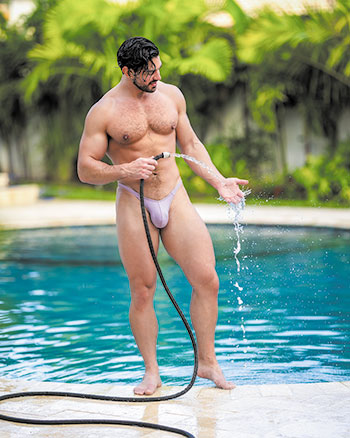 Gregg Shapiro: Since the release of your debut single in 2013, the country-oriented “All American Boy,” several other male country artists — including Ty Herndon, Billy Gilman, Orville Peck and TJ Osborne — have come out as gay. Do you feel that your being an out musician had anything to do with that? Steve Grand: I think, more than anything, it had to do with the major cultural shift that was happening across this country. According to the Gallup polls, public support for gay marriage went from 40 percent approval in May 2009, to 60 percent approval in May 2015. Gay marriage was a big topic of discussion in the early 2010s for a lot of reasons. You had artists like [Lady] Gaga frequently talking about her gay fans; you had gay characters coming out in TV shows; you had the repeal of “Don’t Ask, Don’t Tell” in 2011 and then Obergefell in 2015.
Gregg Shapiro: Since the release of your debut single in 2013, the country-oriented “All American Boy,” several other male country artists — including Ty Herndon, Billy Gilman, Orville Peck and TJ Osborne — have come out as gay. Do you feel that your being an out musician had anything to do with that? Steve Grand: I think, more than anything, it had to do with the major cultural shift that was happening across this country. According to the Gallup polls, public support for gay marriage went from 40 percent approval in May 2009, to 60 percent approval in May 2015. Gay marriage was a big topic of discussion in the early 2010s for a lot of reasons. You had artists like [Lady] Gaga frequently talking about her gay fans; you had gay characters coming out in TV shows; you had the repeal of “Don’t Ask, Don’t Tell” in 2011 and then Obergefell in 2015.
I think the internet and the rise of social media had more to do with it than anything. Before social media, corporate press and big movie and TV studios drove the narrative on these sorts of things. And because they are beholden to advertisers which are more conservative and risk-averse, they would often avoid even acknowledging LGBTQ+ people for fear it would upset large sections of the country.
But I think social media gave regular people an opportunity to be their authentic selves. And it gave artists/content creators like me the ability to make music and videos that could be seen by millions without needing the backing of a big record label.
Almost 10 years ago, in 2015, you released your full-length debut album All American Boy. When you look back on that time, how would you describe it? It was a whirlwind. I remember being cognizant of the fact that it was all moving fast and that I needed to make a conscious effort to stop and take in all the cool, special, unique experiences I was having. Looking back, I don’t think I listened to that voice inside me enough.
I always felt like my best days were ahead, that my moment had yet to come, and I just needed to hunker down and keep working. And, unfortunately, that often kept me from embracing the present moment.
It’s funny; my best memories of that time end up being all the times in between, like the road trips with my tour manager and whatever members of the band I was traveling with. I was always thinking about what I needed to be doing better or focused on the show, but it is those conversations on the road — when we were tired, hungover and stressing about where we needed to be, traveling from one venue to the next — that I remember most fondly.
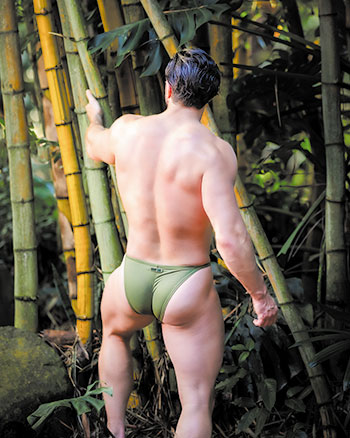 What kind of music are you listening to for enjoyment these days? I am loving the new Billie Eilish record. And the country record Post Malone just made. I continue to appreciate him more and more. Whenever I see him in interviews I am just so impressed with how centered and genuine he is, how he seems to know exactly who he is. There is a real depth and a goodness in him, and I think that really comes through in his voice.
What kind of music are you listening to for enjoyment these days? I am loving the new Billie Eilish record. And the country record Post Malone just made. I continue to appreciate him more and more. Whenever I see him in interviews I am just so impressed with how centered and genuine he is, how he seems to know exactly who he is. There is a real depth and a goodness in him, and I think that really comes through in his voice.
Am I remembering correctly that for a while, you left Chicago for Los Angeles? If that’s correct, what was that experience like for you? I spent some time in LA while I was making my first record. I stayed with a friend of a friend. Funny enough, I had never met them before the day I showed up at their door with my bags. It was on my 24th birthday. They gave and gave to me and never expected anything in return.
I don’t think I ever went out and did any nightlife there. The friends I stayed with had a large group of friends and threw a lot of parties and events, so I really benefited from having their sort of built-in group of guys to hang out with when I stayed out there.
How long have you been back in Chicago? Other than the several months I’ve spent in LA, my summers in P-Town and winters in Puerto Vallarta, I’ve been in the Chicago area the whole time.
What do you like best about being in Chicago? The lakefront in the summer. The fact that the crummy winters are something we all endure together, which means we also experience the beauty and aliveness of the spring and summer together. The winters are so cold and dead, but it makes you appreciate the beautiful weather in the summer, and all the plant life that comes back to life.
The whole city comes alive when it starts getting nice. Everyone’s mood is lifted, and there is a real sense that we need to make the most of the summer because it’s fleeting. I also love the people. Chicago is not as transient as cities like LA and New York, where most people are not from there. Most Chicagoans have roots here. And people are genuinely nice and kind.
In 2019, you launched Grand Axis, a clothing line designed by you that includes underwear, swimwear, shorts, socks, t-shirts and hats. How did you come up with the name Grand Axis? I was about two weeks from going into production with the name “Grand.” I stupidly assumed I could use it because it was my name, but decided I should hire a trademark attorney just to be sure. I was told there were about 200 other companies that could have a copyright infringement claim, so I needed to come up with a name very quickly.
I used word generators and all sorts of other methods of coming up with names. I went with “Axis” because I just like how it sounded together. I thought the word “Axis” was very strong, and I liked that it had the letter X in it, which just looks cool and strong.
Was designing this kind of clothing a lifelong passion of yours, or was it something you stumbled upon and decided to run with it? Like a lot of gay men, I had my sexual awakening in the men’s underwear aisle at our local department store [laughs]. And personally, I’ve always found an attractive guy in a speedo, briefs or jockstrap even more sexy than seeing him naked.
Even when I was a college student working a $10 an hour job and didn’t even have many regular clothes, I was buying more of this attire for myself than anything else. I started to get very fixated on the design and fit. I didn’t know how to sew, but I learned enough to make basic alterations to design and fit.
Then I found some sites that made custom pieces. I began drawing my own patterns and having them sewn up. When I posted them on Instagram, I’d get lots of guys asking where they could buy them. And at that point I decided I should just produce them en masse. I thought it would be a side gig. I had no idea all that was involved.
I think, if I knew how hard it would be, I may not have started it [laughs]! So, my ignorance kind of worked out to my benefit, because now I am deep in it and I’m happy I made it all work. So far at least.
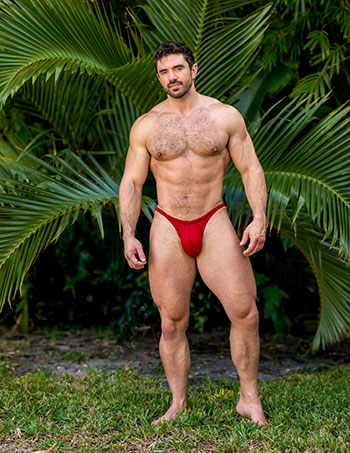 What’s the most rewarding part of Grand Axis? Going to the beach and seeing guys I don’t even know wearing my brand! It is so rewarding to see guys enjoying and looking great in something I spent hundreds of hours obsessing over every detail. That makes it all so worth it.
What’s the most rewarding part of Grand Axis? Going to the beach and seeing guys I don’t even know wearing my brand! It is so rewarding to see guys enjoying and looking great in something I spent hundreds of hours obsessing over every detail. That makes it all so worth it.
What’s the most challenging part? A few things. Delegating. Dealing with factories to get them to make the pieces exactly how I want. Always having to make decisions about every aspect of the products and the business. The stress of wiring tens of thousands of dollars of my own money before I see any product.
At the end of the day, if the factory goes under, you really don’t have any recourse. I’ve heard horror stories from other brands.
You shared your recent pec tear workout injury, as well as your recovery, on social media. Are you fully back to 100 percent or still taking it easy? I am very grateful to be able to say recovery has been easy and painless. I had an excellent surgeon. The first surgeon I saw said it could not be repaired, so I am very glad I got a second opinion!
The worst part has been not being able to move much weight with it. There are so many exercises I can’t do. I’m afraid to say I have only had a handful of workouts in the last 10 weeks. I will be 75 percent healed at 12 weeks, but it will still be a few months before I can lift heavy.
But in the scheme of things, I am just grateful I had a problem that could be fixed!
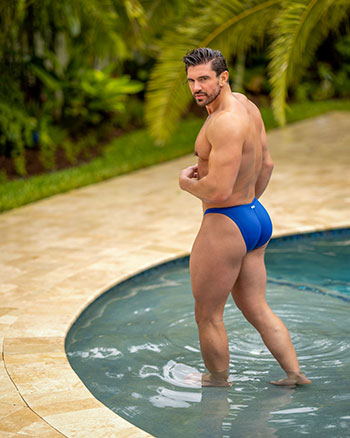 Your second album, Not The End of Me, was released in 2018. Because most people came to know you as a singer/songwriter first, I’d be remiss if I didn’t ask if there was more music from you in the works. I still will write music, but most songs are incomplete. I wish I could say I had another record ready to go, but when the pandemic happened, and I wasn’t able to perform and lost 90 percent of my income that year, I had to make Grand Axis my full-time job to pay the bills. And now that it has, I struggle to find the time and creative energy to make that [new music] happen. But I am still hopeful I will get back to it one of these days.
Your second album, Not The End of Me, was released in 2018. Because most people came to know you as a singer/songwriter first, I’d be remiss if I didn’t ask if there was more music from you in the works. I still will write music, but most songs are incomplete. I wish I could say I had another record ready to go, but when the pandemic happened, and I wasn’t able to perform and lost 90 percent of my income that year, I had to make Grand Axis my full-time job to pay the bills. And now that it has, I struggle to find the time and creative energy to make that [new music] happen. But I am still hopeful I will get back to it one of these days.

